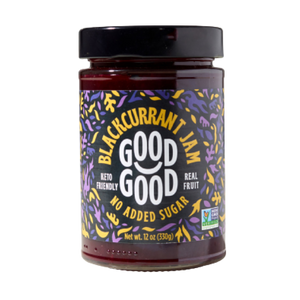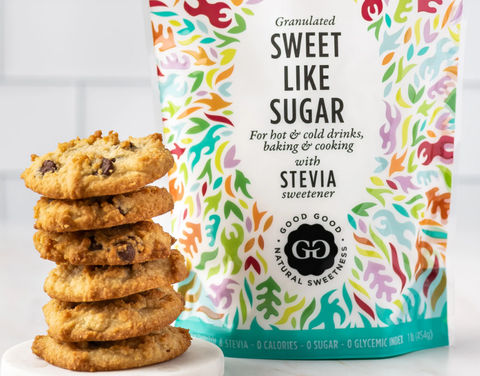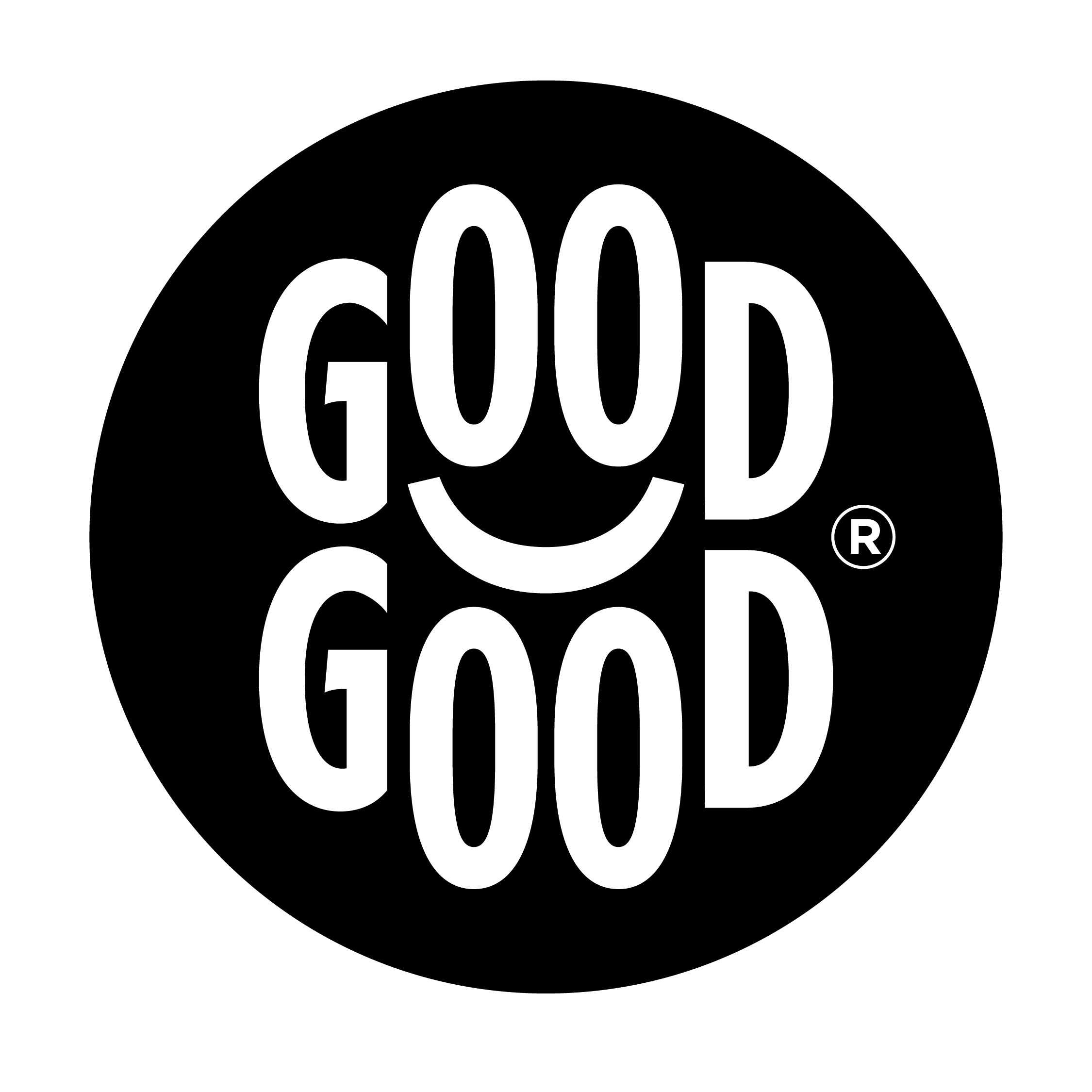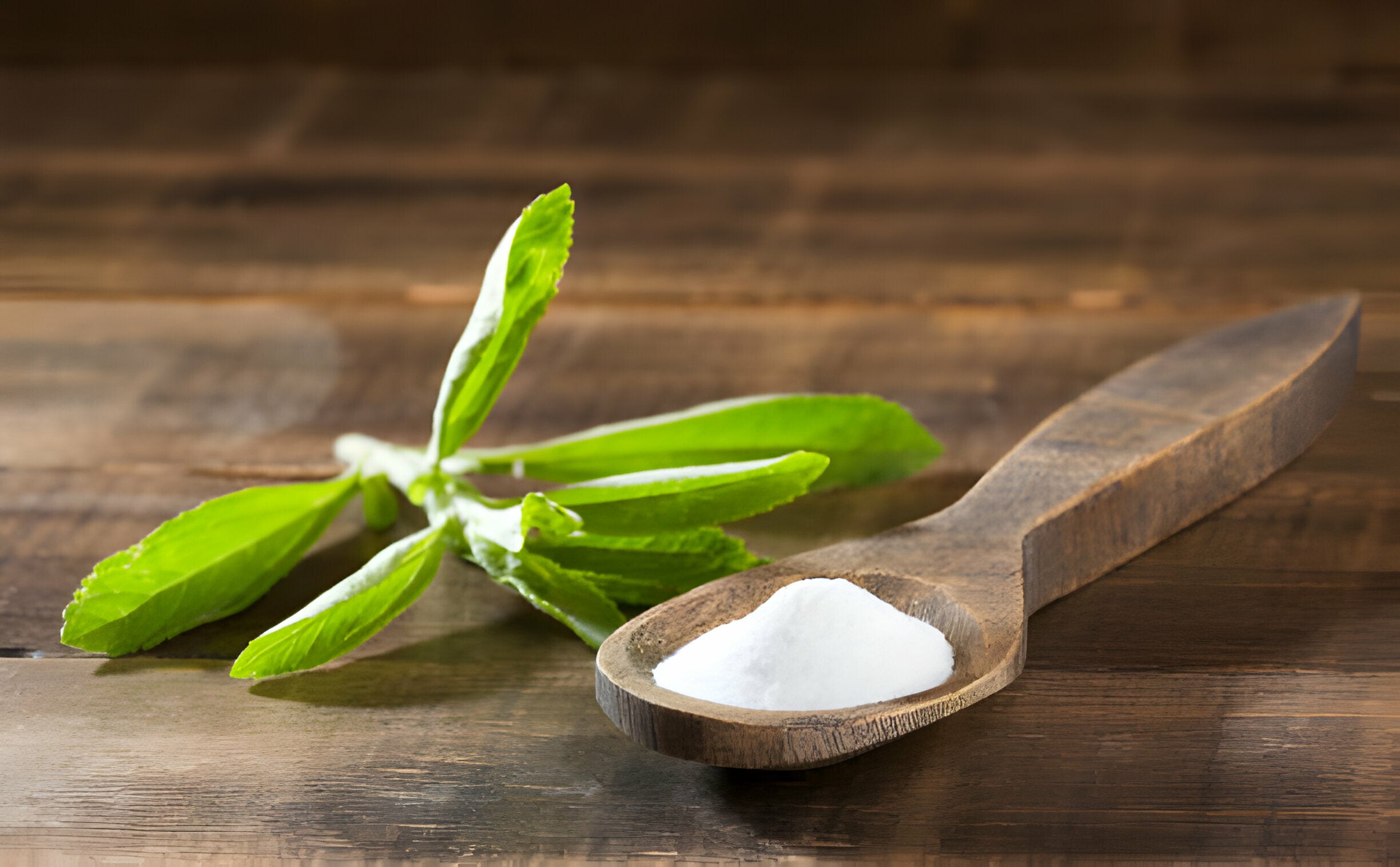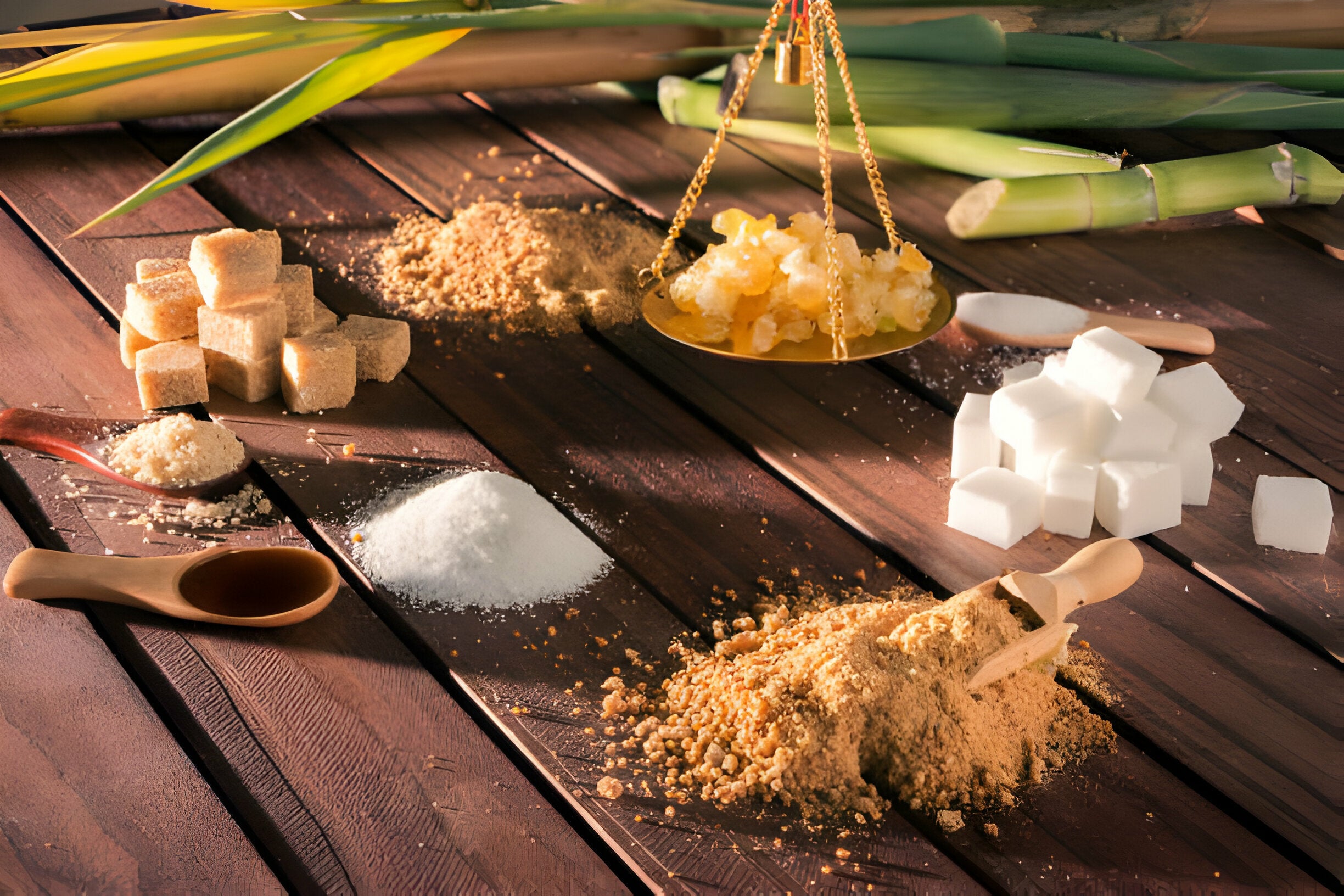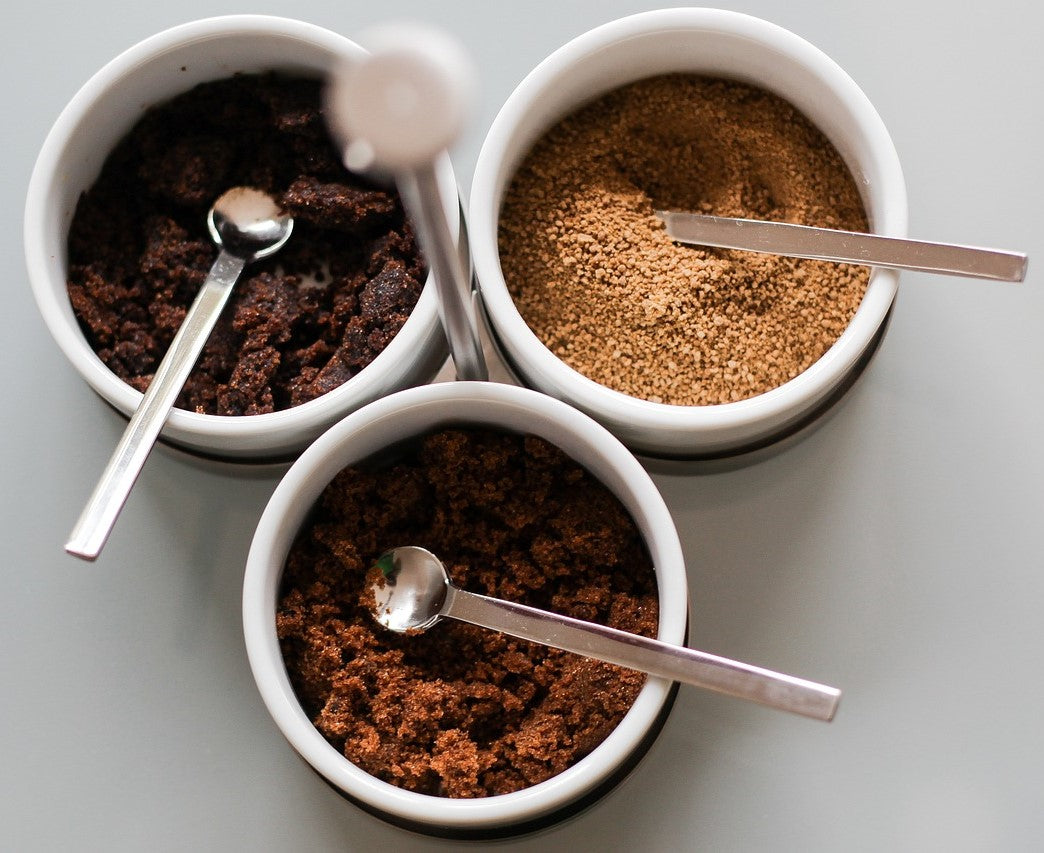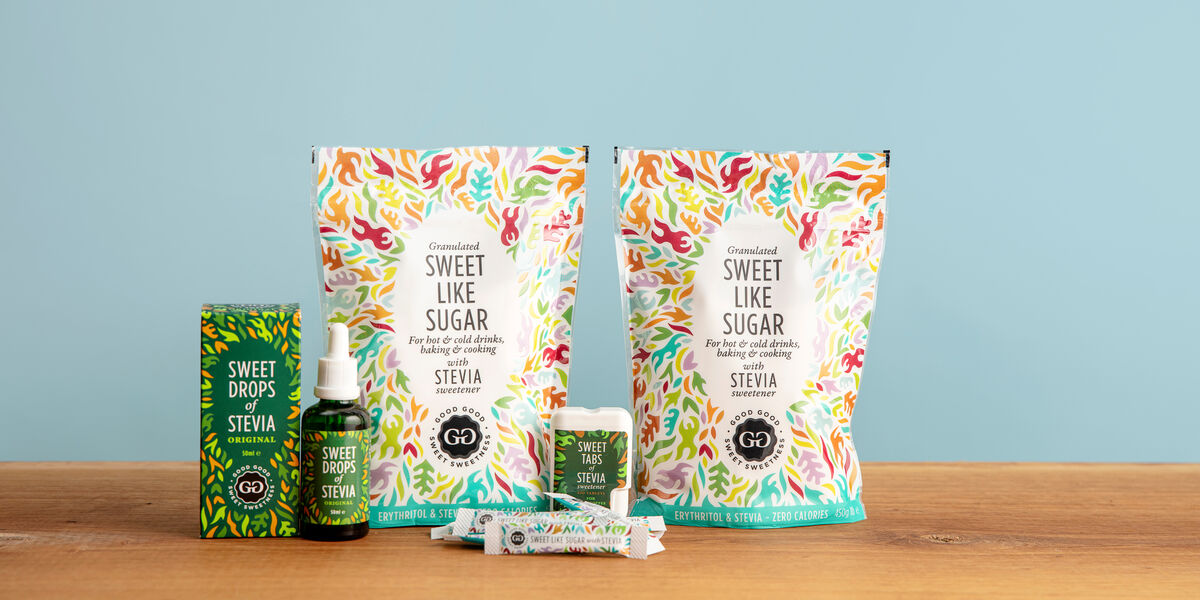At GOOD GOOD, we understand the importance of leading a robust lifestyle with our sugar substitutes. That's why it's important to understand the key differences between ‘artificial sugar vs natural sugar'.
Artificial sugars, like aspartame or sucralose, are synthetically produced, have minimal calories, and can aid in weight management.
However, due to their composition, there's a potential for adverse effects on your digestion or potentially causing diabetes.
In contrast, natural sugars, such as stevia and erythritol, occur in fruits and plants and are found in our products. Additionally, they provide nutrition, and promote heart health and glycemic control.
In this article, we'll explore the best sources of both artificial and natural sugars and provide practical tips for a balanced diet.
Let's dig in!
What this article covers:- Is Natural Sugar Better for You Than Artificial Sugar?
- What to Know About Artificial Sugars and Natural Sugars
- Best Artificial Sources of Sugars
- Best Natural Sources of Sugar
- Natural Sweeteners vs Artificial Sweeteners FAQ
Is Natural Sugar Better for You Than Artificial Sugar?
Through our practical knowledge, natural sugars and sugar alcohols, found in fruits and vegetables, come with essential nutrients, vitamins, and fiber, which contributes to a more moderate diet than artificial sugars.
While beneficial for calorie reduction, artificial sweeteners may not offer the same nutritional value and can negatively impact your wellness.
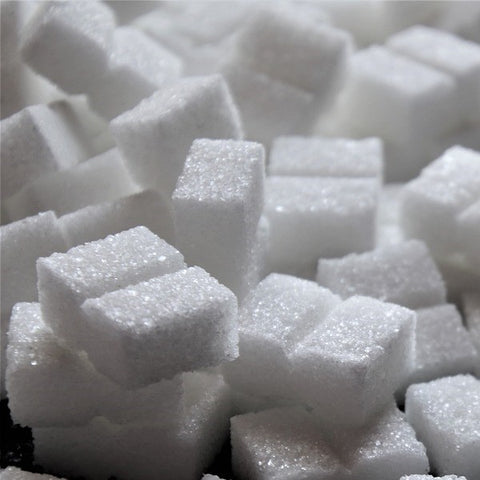
What to Know About Artificial Sugars and Natural Sugars
What Are Artificial Sugars?
Artificial sugars are sweeteners that are either synthetic or derived from naturally occurring substances.
They provide a sweet taste without the calories, making them an attractive option for weight management and diabetes control.
However, our research indicates that they should be consumed in moderation as their long-term effects are still being studied.
Examples include:
- aspartame
- sucralose
What Are Natural Sugars?
Natural sugars are found in fruits, vegetables, and dairy products. They're rich in nutrients like fiber, vitamins, and minerals, contributing to a balanced diet.
At GOOD GOOD, we advocate for the use of no sugar added sweeteners like erythritol and stevia, which offer healthy benefits beyond mere sweetness.
We believe in providing you with natural sweetener options, empowering you to make informed lifestyle choices.
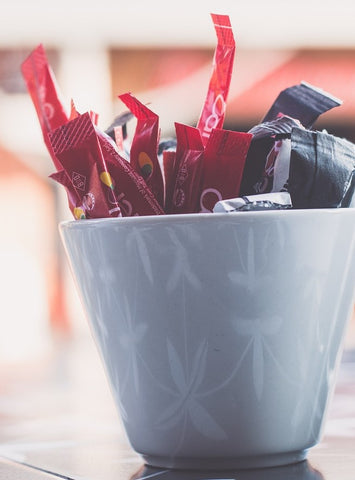
Best Artificial Sources of Sugars
Let's explore some of the best artificial sweeteners that can help you maintain a nutritious diet.
Table: Artificial Sugars Vs. Refined Sugars
|
Artificial Sugars |
Sweetness Compared To Refined sugar |
Calorie Content |
Common Uses |
FDA Approval Status |
Health Considerations |
|
Acesulfame Potassium |
|
|
|
|
|
|
Advantame |
|
|
|
|
|
|
Aspartame |
|
|
|
|
|
|
Neotame |
|
|
|
|
|
|
Saccharin |
|
|
|
|
|
|
Sucralose |
|
|
|
|
|
Acesulfame Potassium
Acesulfame Potassium, also known as Acesulfame K, is a calorie-free sweetener used worldwide. It's about 200 times sweeter than refined sugar and commonly used in baking and soft drinks.
Advantame
Advantame is a newer addition to the artificial sweetener market.
It's derived from aspartame and vanillin and is much sweeter than regular sugar. Based on our observations, only a tiny amount is needed to achieve the desired sweetness.
Advantame doesn't raise blood sugar levels, making it a suitable option for those managing diabetes.
Aspartame
Aspartame, one of the most popular artificial sweeteners, is found in many diet sodas and sugar-free products. It's about 200 times sweeter than table sugar.
While there are concerns about its effects, studies by the World Health Organization (WHO) have deemed it safe for consumption in moderation.
Neotame
Neotame is a derivative of aspartame, but it's nearly 13,000 times sweeter than table sugar and retains its sweetness when heated.
Due to its high sweetness, only trace amounts are needed. Neotame has been recognized as safe by various health organizations, including the Food and Drug Administration (FDA).
Saccharin
Saccharin is one of the oldest artificial sweeteners, discovered in the late 19th century. It's 300 to 400 times sweeter than regular sugar and has a slightly bitter aftertaste.
Despite early controversies, research shows that Saccharin is safe for human consumption.
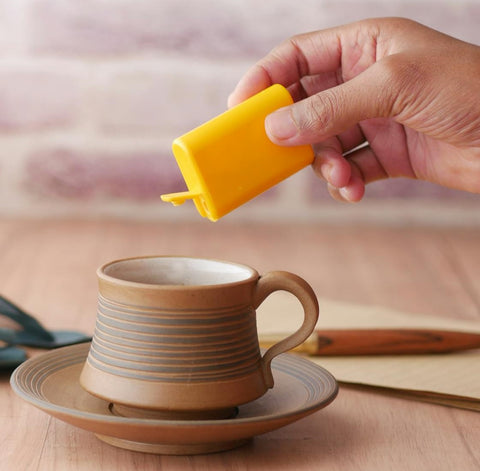
Sucralose
Sucralose, marketed under brands like Splenda, is another widely used sweetener. It's about 600 times sweeter than processed sugar and can be used in cooking and baking.
Our investigation demonstrated that Sucralose has been deemed safe for general consumption.
By incorporating these artificial sweeteners into your diet, you can enjoy the sweetness without the added calories. However, always remember that moderation is key to a balanced and healthy lifestyle.
For a more natural sweetener, you can try our stevia drops - where a little goes a long way. They come in a variety of GOOD GOOD flavors - from vanilla to lemon, to elevate your meals and beverages.
Best Natural Sources of Sugar
Let's delve into the best white sugar alternatives, which provide not only sweetness but also wellness benefits.
Table: Natural Sugars Vs. Refined Sugars
|
Natural Sugars |
Sweetness Compared To Refined sugar |
Calorie Content |
Common Uses |
FDA Approval Status |
Health Considerations |
|
Stevia |
|
|
|
|
|
|
Erythritol |
|
|
|
|
|
|
Xylitol |
|
|
|
|
|
|
Date Palm |
|
|
|
|
|
|
Grapes |
|
|
|
|
|
|
Sugar Beet |
|
|
|
|
|
|
Sweet Sorghum |
|
|
|
|
|
|
Sugarcane |
|
|
|
|
|
|
Jaggery |
|
|
|
|
|
|
Honey |
|
|
|
|
|
Stevia
Stevia is a natural sweetener derived from the leaves of the Stevia rebaudiana plant found in Paraguay, South America.
It's the best zero calorie sweetener and up to 300 times sweeter than sugar. This makes it an excellent choice for those looking to reduce their sugar intake.
After trying out this product, our stevia vanilla drops can help you manage your blood sugar levels, making it a favorable option for diabetics and those monitoring their carbohydrate consumption.
Erythritol
Erythritol is a sugar alcohol naturally found in certain fruits like grapes and fermented foods with 70% of the sweetness of processed sugar.
This is especially true of our Sweet Like Sugar sweetener, which is one of the best natural sweeteners for tea. Our team discovered through using this product that it's gentle on teeth and prevents gum disease.
Erythritol doesn't spike blood sugar or insulin levels either, making it an excellent alternative for people looking to maintain a low-glycemic diet.
At GOOD GOOD, we sweeten our 99% sugar free jelly collection with erythritol as well to provide you with delectable and nutritious spreads.
Xylitol
Xylitol is another sugar alcohol that's comparable to erythritol in its low-calorie profile and dental benefits. It has a sweetness similar to that of regular sugar, making it an easy substitute in recipes.
Xylitol is particularly known for its ability to reduce the risk of tooth decay. Based on our observations, it's a popular ingredient best utilized in sugar-free chewing gums and dental care products.
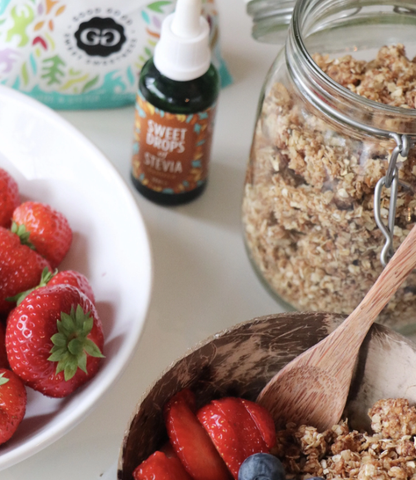
Date Palm
Date palm sweeteners, derived from the sap of the date palm tree, are rich in nutrients and antioxidants. They offer a caramel-like sweetness that can enhance the flavor of various dishes and beverages.
Unlike refined sugars, date palm sweeteners retain their nutritional content, providing a source of vitamins and minerals alongside their natural sweetness.
Grapes
Grapes, both fresh and dried, are excellent natural sweeteners. They're rich in antioxidants and contain natural sugars that can satisfy any sweet cravings.
It can be used in a variety of culinary applications, from sweetening smoothies and desserts to creating natural syrups and jams like our sugar free grape jelly.
Through our trial and error, we discovered that it has 88% less calories than jellies made by our competitors. Moreover, it's low in carbs and suitable for diabetes management.
Sugar Beet
Sugar beet is a root vegetable containing a high concentration of sucrose. It's one of the leading sources of natural sugar in the world.
The sugar extracted from sugar beets is identical in chemical composition to that obtained from sugarcane, making it a healthy, natural sweetener.
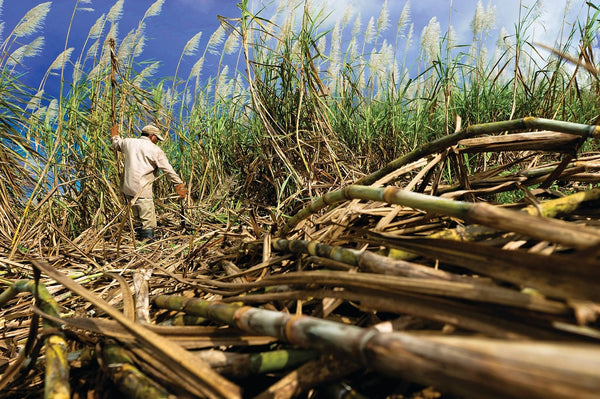
Sweet Sorghum
Sweet sorghum is an environmentally friendly crop known for its sugar-rich stalks. It's predominantly used for producing sorghum syrup, a natural sweetener.
Through our practical knowledge, sweet sorghum requires less water for growth and is adaptable to various climates, making it a sustainable choice for natural sweetness.
Sugarcane
Sugarcane is one of the most popular and abundant sources of natural sugar. It's a sweetener that tastes most like sugar and produces sugar, molasses, and other sweet products.
Additionally, it's rich in antioxidants and can contribute to a balanced diet when consumed in moderation.
Jaggery
Jaggery, a traditional Indian sweetener, is made by evaporating the water from sugarcane juice. Our findings show that it retains more nutrients than refined sugar because it's less processed.
Jaggery is rich in minerals and can aid digestion, making it an excellent low sugar substitute for honey as well.
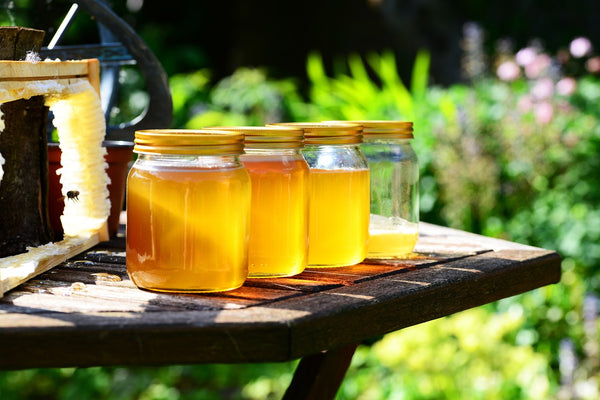
Honey
Honey is a natural sweetener produced by bees using nectar from flowers. It's known for its distinct flavors, which vary based on the flowers used by the bees.
It's not just the best substitute for refined sugar in baking; it's also packed with antioxidants and has excellent antimicrobial properties.
By choosing these healthier sugar substitutes, we at GOOD GOOD are committed to providing robust alternatives to processed sugars.
Natural Sweeteners vs Artificial Sweeteners FAQ
Should I Cut Sugar From My Diet?
Cutting sugar entirely isn't necessary if balanced with a healthy diet.
Reducing refined sugar intake is beneficial, as excessive sugar can lead to:
- weight gain
- diabetes
- heart issues
We recommend replacing regular sugar with a natural sweetener like our GOOD GOOD Sweet Like Sugar product. It can satisfy your sweet tooth while offering a more nutritious profile.
How Much Sugar Is Ok To Have?
The American Heart Association suggests limiting added sugars to no more than 6 teaspoons (25 grams) per day for women and 9 teaspoons (38 grams) for men.
We suggest monitoring your intake and opting for natural sweeteners, which can provide the right flavor without the adverse health effects associated with high sugar consumption.
Whether you choose natural or artificial sweeteners, moderation is key. Our GOOD GOOD range offers delicious alternatives like our vanilla stevia to help you manage your sugar intake.
Conclusion
In this sweet journey, we've covered the 'artificial sugar vs natural sugar' debate and introduced the best options from both worlds.
Overall, natural sugars are the better option ahead of artificial sugars due to their nutritional value and lack of chemical processing.
Now, why not take a delightful step towards a balanced lifestyle? Visit us at GOOD GOOD and add a touch of GOODness to your meals and drinks with our healthier sugar substitutes!
Did our blog meet your needs? You might also find our other guides helpful:
- Is Grape Jelly Gluten Free?
- Is Jelly Gluten Free?
- Is Jam Gluten Free?
- Is Orange Marmalade Gluten Free?
- Most Popular Jelly Flavor
- Best Grapes for Jelly
- How Much Sugar Is in Jelly?
- Best Sweetener for Diabetics
- Is Stevia Healthy?
- Is Stevia Good for Diabetics?
- Is Stevia Keto?
- Best Natural Sweetener
- Healthiest Sweetener for Coffee
- Is Sugar Gluten Free?
- Best Tasting Sugar Substitute






